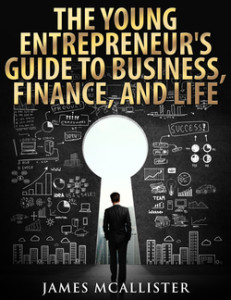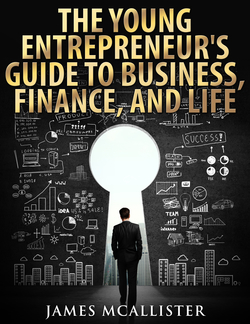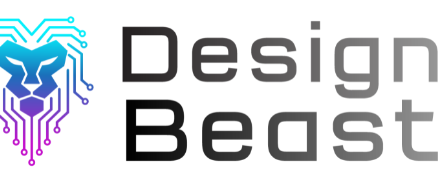James McAllister's New Book
 Regular readers may remember my recent interview with James McAllister – a talented and hard-working young blogger who is popping up all over the place these days.
Regular readers may remember my recent interview with James McAllister – a talented and hard-working young blogger who is popping up all over the place these days.
James offered me a review copy of his latest book “The Young Entrepreneur's Guide to Business, Finance and Life”.
To be honest, seeing it was over 100 pages long, I wondered how I would find the time to read it all – but it was such a riveting read that, although I needed a couple of sessions, I read it “cover to cover”.
Define Young Please!
I'll address right away the objection that you may feel this book is not for you – if you're, err, past the first flush of youth, like I am.
This book can still teach you plenty if:
- Your business is “young” – defined as not yet achieving everything you want it to
- You have family / friends coming up to university or college age. In fact it's vital for them
True, readers in the first category will find sections of the book that do NOT apply to them, but for the low price of the book there is a host of other information to help an online (or offline) business improve its performance. (I'm not ashamed to say that James has given me many tips that have helped me – some found within this book.)
Readers in the second category, who may be involved in advising their sons or daughters what to do after college really SHOULD read this, because a strong theme of the book is….
How To Avoid Student Debt
It's sort of obvious at one level. If my sons had come to me and told me, at age 18, they were thinking of racking up tens of thousands of debt, I would have said “Hey – are you nuts?”
But just because the end result (student debt) is prefaced with “I'm going to college / university so (I'm racking up a massive debt)” it's supposed to be absolutely fine. Well, James and an increasing number of school-leavers are realizing that it's madness for so many young people to be starting their adult lives with massive student debts.
This is all the more crazy when you look at the state of the job market these days. It won't take long to realize how few graduates are able to get a well-paid job, using the subject they studied, that would (maybe) justify the debt they are left servicing.
Student Debt and Mortgages
I heard a radio program about “help for finance problems” the other day and a young couple who HAD been lucky enough to make a start in professional careers, both earning good money, were refused a mortgage because they already had such high levels of student debt.
HAD been lucky enough to make a start in professional careers, both earning good money, were refused a mortgage because they already had such high levels of student debt.
So in effect they were sentenced to paying rent (at about the same cost as the mortgage) for years to come, just because they had followed the party line and emerged from university with their student loans.
They could be classed as being in the “lucky” group, because they had at least benefited from their qualifications. Imagine the poor souls stacking super-market shelves while waiting for their dream “media studies” career to materialize.
So – in my opinion – anything that shows people how to avoid student debt, or any debt, is a “must read”.
Alternatives To College
Families with college age kids should be aware that there ARE alternatives to university or college, that make complete sense. The alternative that James recommends is starting your own business and he presents very compelling reasons – and practical “how to” steps – for doing this.
Of course, this opens up the readership of this book to yet another group of readers – people, with or without qualifications, who just cannot find a job. Again, some sections won't apply – but much will.
Why Should You Listen To James?
 In a nutshell, listen to James because he's not preaching theory. He's DONE it. He's got the blogs and published books to prove it.
In a nutshell, listen to James because he's not preaching theory. He's DONE it. He's got the blogs and published books to prove it.
Do NOT look at James's youthful picture and fall into the trap of thinking he's just a “wanna-be” business-man.
That would be a BIG mistake! He has more guts, determination, business sense and entrepreneurial spirit in his little finger than most adults I know have in their whole body. The wisdom he shares is beyond his years.
If you read my interview (noted above) you have only scratched the surface of James's experience. When you read more about his accomplishments to-date in his book, you'll be amazed – although he's characteristically modest and dismisses them in just a few paragraphs.
His book speaks directly to people his own age, and in language they will understand. However, it teaches valuable lessons to parents too – if they are open-minded enough to listen!
My Opinion As A Parent
Some of what James says might make the average parent quake 🙂 He speaks his mind, but I'm originally a Yorkshire lass and “oop norf” we consider that a virtue. Apologies to those of my readers who have never heard of Yorkshire, but, broadly speaking we prefer people (like James) who tell it how it is, rather than saying what you “want to hear”.
With my parent hat on, I was amused by James's recommended way for students to finance their living costs in the early days of their business. But, hey, it's what most of them are doing anyway, and far better to be doing it while starting their own business, rather than “finding themselves” or studying ancient languages.
Starting a business instead of going to college, as James is suggesting, does go counter to everything that my generation were brought up to aspire to, so as a parent you might find his recommendations rather shocking.
But remember that conditions have changed now. When I was university age (in the UK):
- Student debt was not the norm, because there were grants
- Nowhere near as many people went to college / university
- The courses on offer were more targeted towards a career (no media studies etc)
- Finding a job / career was much easier
There have been a lot of changes since then. So parents in 2015 need to open their minds to a different way of thinking, and factor in the current economic climate.
I come from a long-line of self-employed entrepreneurs and dearly wanted to follow my parents straight into their business. But they insisted I continue my education and get a career. And AT THAT TIME, they were correct to do so. After about 8 years the self-employment bug was still nagging at me, so – equipped with various relevant skills – I went self-employed and have stayed that way with a brief hiccup when I supplemented my income with a part-time job for just a few years.
What Did My Sons Do?
Old habits die hard and my sons were encouraged down the traditional university route. Funnily enough I remember discussing future family careers with my bank manager and, at the time, I was shocked when he said he would encourage his sons to go into a trade rather than university. What a far-sighted man. I hope his sons took notice of him.
As for my sons, neither of them resisted the college route and they emerged with student debts – although nowhere near the level that today's students are burdened with. I think we'd all have balked at that!
My elder son got an excellent job using his qualification, paid off his student debt and earned enough money to build up equity in his own property. Then, he was made redundant at the age of 32 when his well-paid job was out-sourced to cheap overseas labor. At this point he announced that he was burnt out with the stress of his job and commuting / working all hours just to pay travel costs and mortgage. So he took the equity in his suburbia flat, and started up a business in Spain. He's no millionaire but he's doing better than we dared expect, and he's happy with a fairly relaxed lifestyle that he enjoys. So who am I to judge?
My younger son studied “Investment, Finance and Risk” and we all watched with pride as he did his work-experience internship with an investment bank, really looking the part with slick suits and shiny shoes.
Then one evening he said he needed to talk (uhuh) plonked a drink in front of me and announced that he'd had a change of heart and investment banking wasn't for him. The property investment module of his course had fired his imagination and that was what his heart was set on – with a little help from his Mum 🙂
He's not a millionaire either – but neither is he an unemployed banker. He probably works harder than anyone I know, but his property business is growing and he has the freedom to make his own decisions and live with the consequences. Compared to his peers (and academic superiors – as he'd be the first to admit) he's way ahead of some who still haven't got that elusive first step on the career ladder yet.
So if your college-aged son or daughter wants to pursue a business venture as an alternative to college, I encourage you to support their decision in whatever way (financially and emotionally) you would have supported the college route.
And reading James's book is an excellent value way to start.
In Favor Of James's Book
No prizes for guessing that I'm very much on-side with James's recommendation for young people to avoid student debt and start their own business. The excellent points he makes are:
- Taking on student debt to finance a hypothetical career is no longer the “sensible” choice in life, it's a high risk strategy
- If you're taking a chance on starting your own business, best to do it young before you have family commitments, and when you have time to “start again” if everything goes pear-shaped
- James encourages savings, having an emergency fund and reinvesting part of your profits
- Place a value on your time and happiness
- He points out that he's given up a lot to reach his success level, and warns you to expect hard work “An entrepreneur who only works 12 hours a day is slacking”. Writing this after 2am, I can relate to that one!
But don't think this is just a book about James's opinions – other chapters are packed with extremely practical advice on:
- Good habits to develop in your finances
- How to budget
- Minimalism
- Finding a niche
- Which type of product / service to choose
- Creating a sales funnel
- Segmenting and up-selling
- Branding
- Why blogs are the platform of choice – whatever your business
- Price testing
- Sales psychology
- The art of making friends in high places
- Getting other people to sell your product for you
- How successful people manage their finances, and how you can too
- Managing your time – a neat approach I'd never thought of doing
Some of these are terms that will be familiar to many of my readers, but NOT to the average 17 year old, nor even to many parents with the luxury of steady jobs and no concept of being in business.
So the book is essential reading (a) before deciding if you're up to the entrepreneurial life and (b) to get you into a business mindset and (c) for practical advice to get you on the road to success.
I wish I had read James's book before I started my online business. These are subjects I've learned the hard way, through making mistakes that cost me far more in time and stress than the few paltry dollars James is charging. ($9.99 at the time of writing, March 2015.)
Any Reservations?
Only a few….
Although James warns clearly at the outset and several times through the book that starting your own business won't be easy, he somehow makes it sound easy.
My fear is that people without James's work ethic may read the book and not realize just how exceptional his talents are, and that because of his sheer dedication his achievements are way beyond what many people of any age will achieve. Only someone who has trodden that road already will actually know how many hours of hard graft and research are behind James's success stories.
Yes, anyone COULD do it, but it takes a very special 18 year old to stick to such a tough schedule. I suspect there are more “lazy pansies” out there than James work-alikes 🙂
James does warn that paid traffic is a risk and clearly advises testing, but I fear that the “apparent” ease (LOL) with which he achieved his success might tempt less skilled individuals into borrowing money for paid traffic and advertising in anticipation of profits and, worst case, ending up in just the sort of debt they set out to avoid.
It's impossible to distill all James's business experiences into just 100 pages, but I think it would be helpful to have seen a few more warnings of the big mistakes an innocent abroad can make. For example a quick explanation on why WordPress.org is recommended rather than WordPress.com. Those three little letters sound so temptingly similar to the unwary, and .com might (incorrectly) be the one newcomers plump for.
A Few Suggestions…
I missed seeing clickable links in the text, to take me to resources James discussed. Revisiting later, the links ARE clickable, just not “blue”. I'm experienced in using eBooks and still missed that fact. So be sure to follow his links.
Some people will say that James has been very ethical not to have included affiliate links, but I would have welcomed them. If people don't like affiliate links it's easy enough not to use them.
I understand why James doesn't go for a hard sell and respect him for that, but I would have liked to see him place more emphasis on recommending newcomers to pay for his professional services to do jobs they'll only do once – for instance he could set them up a really professional blog with all the bells and whistles from day 1. This would free them from a one-off task that they'll almost certainly do sub-optimally, and leave them to concentrate on tasks they need to do day-to-day. How to fund this? Several methods spring to mind: combined family Christmas / birthday gifts plus many other ways James lists in the book.
Although James includes his contact details, my fear is that without an obvious route to him readers will wander off at a tangent and find someone not as honest and competent as James.
I'm not qualified to comment on the section on “Investing for Beginners”, because my experience has been the exact opposite of James's. I found property investing (once I'd got started!) far more straight forward than the stock market, where I lost money, despite being part of a club of very experienced investors and picking shares for their dividends. Other investments recommended to me came with hefty initial charges that (had I gone ahead) would have reduced my sum invested to the extent that it could have taken two years just to get back to where I started. So I'd add a big “Caveat emptor” – the value of your investments can fall as well as rise, and you may not get back what you invested.
Long-term Wishes For James
This is a personal opinion really, but I found James's views on marriage and children, although factually correct – a little too vehement 🙂 Funnily enough he echoes exactly what Matt always used to say… until he met his soul-mate and married her. She works alongside him in his business and they are “for each other” thick and thin. I would adjust James's recommendations to a warning to check and double check that any wife or partner is as fully committed to and involved in the business as you are. The right two heads are better than one.
I won't get too soppy, but I truly hope James finds a partner worthy of him, and that when the time is right financially (although it NEVER is LOL) he will have children who bring him as much pleasure as my sons have brought me – far beyond any business successes. They maybe shouldn't be, but they (and my grandchildren) ARE my reason for living. Not my business.
Getting back to the business in hand – I obviously wish James every success with this truly valuable eBook.
Conclusions About The Young Entrepreneur's Guide To Business
 My few reservations above pale into insignificance compared to the business sense and value that anyone who follows James's advice will get for a mere $9.99.
My few reservations above pale into insignificance compared to the business sense and value that anyone who follows James's advice will get for a mere $9.99.
The book isn't stuffed with filler, waffle and “pretty pictures”. That's not James's style.
He tells it like it is and you can take his advice or ignore it. I hope you will take it, and that this book will be widely read.
Even if it's not applicable to someone in your own immediate family, please spread the knowledge that taking on student debt is NOT inevitable.
When you look at the sales page, there's a green “Give as a gift” button in the top right hand side. This book could be the most valuable gift you give your family this year.
As James has proved – by example – there are far smarter options available and you owe it to yourself to be open-minded enough to at least make an informed decision.
Buy / Give “The Young Entrepreneur's Guide to Business Finance and Life” now.
Reading it, and taking action, could help you avoid many thousands of student debt.










